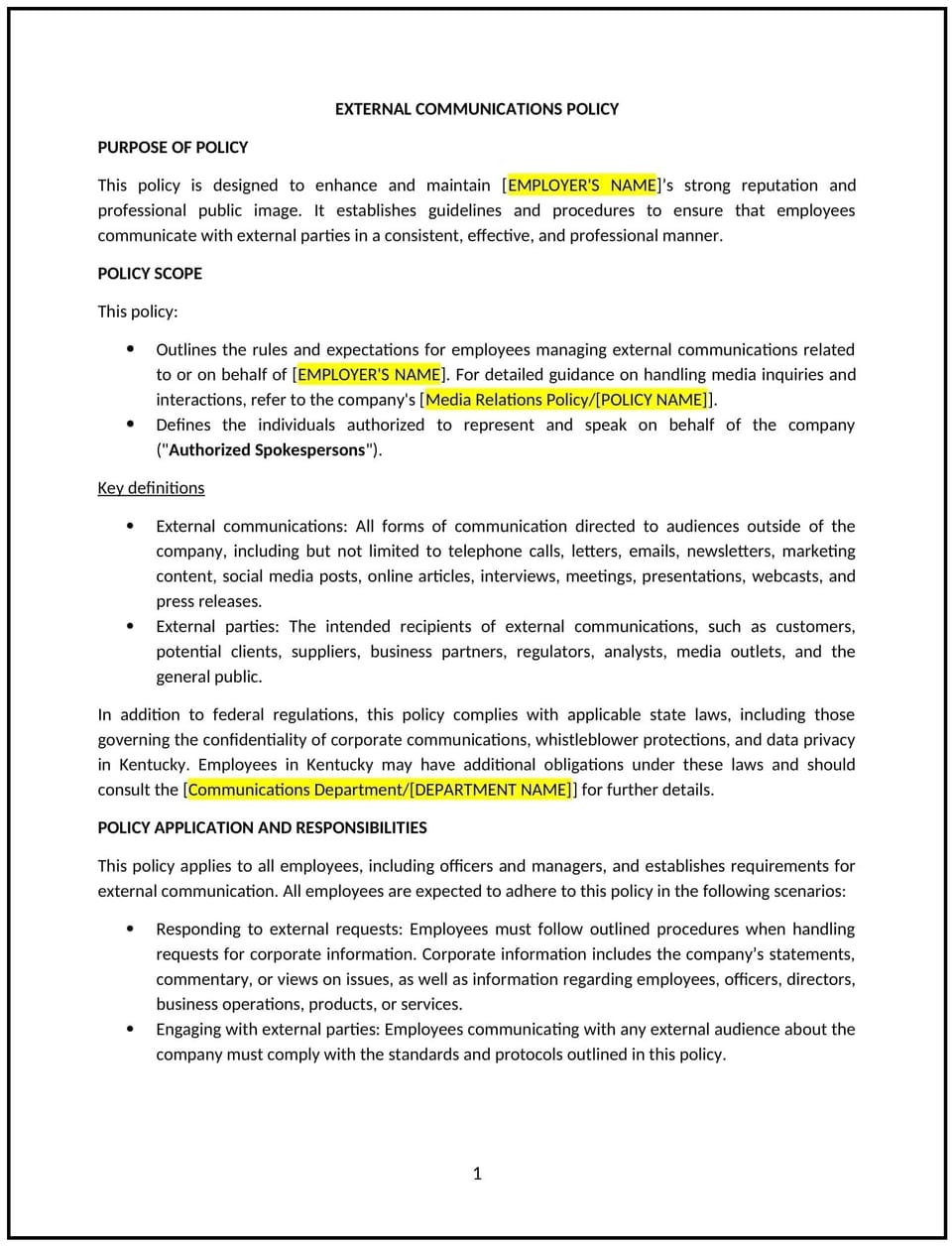External communications policy (Kentucky): Free template

External communications policy (Kentucky)
An external communications policy provides Kentucky businesses with guidelines for managing all communications with individuals or organizations outside the company, including the media, customers, suppliers, and the general public. This policy ensures that external messages are consistent, accurate, and align with the company’s values and objectives.
By adopting this policy, businesses can maintain a positive public image, reduce the risk of miscommunication, and enhance their relationships with stakeholders.
How to use this external communications policy (Kentucky)
- Define the scope of external communications: Clearly identify the types of communications covered by the policy, including press releases, social media posts, public statements, and any communication with external parties such as clients, partners, or regulators.
- Establish spokesperson guidelines: Designate official spokespeople or departments responsible for handling external communications, and outline who has the authority to speak on behalf of the company.
- Set guidelines for social media: Provide clear rules for employees about using social media in a professional capacity, ensuring they understand how to represent the company appropriately and avoid conflicts of interest or public relations issues.
- Promote consistency: Ensure all external communications reflect the company’s branding, tone, and messaging, and that key messages are aligned across different channels.
- Address crisis communication: Include procedures for communicating during a crisis or emergency, specifying how information will be disseminated, who will manage the messaging, and what steps will be taken to mitigate any reputational damage.
- Monitor and respond to inquiries: Set clear procedures for handling incoming inquiries from the media, customers, or other external stakeholders, including response times and the proper escalation process.
- Ensure compliance with laws: Make sure external communications comply with relevant laws, including privacy regulations, intellectual property rights, and advertising standards.
Benefits of using this external communications policy (Kentucky)
This policy provides several key benefits for Kentucky businesses:
- Protects company reputation: Ensures that all external communications are accurate, clear, and aligned with the company’s values, reducing the risk of misunderstandings or misrepresentation.
- Promotes consistent messaging: Helps maintain a unified voice and consistent message across all external channels, which is crucial for brand recognition and trust.
- Enhances relationships with stakeholders: Establishes clear guidelines for engaging with clients, media, and other stakeholders, promoting transparency and trust.
- Reduces legal risks: Ensures that all external communications comply with legal requirements, reducing the risk of legal actions related to defamation, privacy violations, or false advertising.
- Improves crisis management: Provides a clear framework for managing communication during a crisis, helping the business respond quickly and effectively to potential threats.
Tips for using this external communications policy (Kentucky)
- Communicate the policy: Ensure that all employees understand the external communications policy and its importance by sharing it during onboarding and via regular training sessions.
- Designate trained spokespeople: Appoint individuals who are trained in handling external communications, ensuring that only authorized personnel speak on behalf of the company.
- Monitor social media activity: Regularly review social media activity to ensure employees adhere to the guidelines, and that company accounts are managed professionally.
- Prepare for crises: Develop a crisis communication plan in advance to be used if an emergency or issue arises, ensuring a swift and coordinated response.
- Review periodically: Update the policy as necessary to reflect changes in company strategy, legal requirements, or external communication trends.
Q: What is the purpose of an external communications policy?
A: The policy establishes guidelines for managing all communications with external parties, ensuring consistency, accuracy, and alignment with the company’s values.
Q: Who is responsible for external communications?
A: Only designated spokespeople or departments, as outlined in the policy, are responsible for official communications with the media, clients, and the public.
Q: How should employees handle social media?
A: Employees should follow the company’s guidelines for social media use, ensuring their posts reflect the company’s values and do not misrepresent the business.
Q: How does the company handle crisis communication?
A: The policy outlines specific procedures for communicating during a crisis, including who will manage external messaging and how the company will respond to media inquiries.
Q: What should employees do if they receive media inquiries?
A: Employees should direct any media inquiries to the designated spokesperson or communications team, as outlined in the policy, to ensure consistent and accurate messaging.
Q: How often should the external communications policy be reviewed?
A: The policy should be reviewed regularly, at least annually, to ensure it remains aligned with changes in the business, industry trends, and legal requirements.
Q: What happens if employees violate the external communications policy?
A: Violations may result in disciplinary action, including warnings or more severe consequences, depending on the severity of the breach.
This article contains general legal information and does not contain legal advice. Cobrief is not a law firm or a substitute for an attorney or law firm. The law is complex and changes often. For legal advice, please ask a lawyer.


